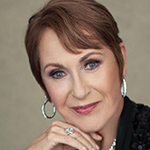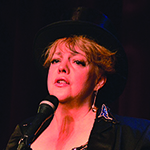Richard Holbrook
“It’s Great to Be Alive”
By Kathleen Landis for Cabaret Scenes
November 22, 2013
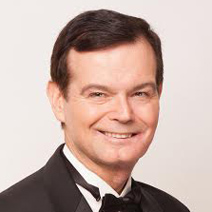
Photo: Jeffrey Hornstein
On the third night of this year’s Cabaret Convention, an evening dedicated to the work of Burton Lane and Yip Harburg, Richard Holbrook took the stage of Jazz at Lincoln Center’s Rose Theater to perform two songs. An ardent supporter of nightlife and a prolific entertainer, the occasion represented the culmination of a dream that was many years in the making. However, while a slot at the convention is an honor for any cabaret artist, the journey that led Richard to that stage, especially since 2013, is remarkable.
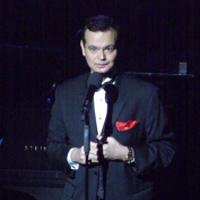
Photo: Theater Pizzazz
I met Richard in 2002 when I was resident singer/pianist in the Café Pierre and he was a newcomer to the city with a dream to sing. The following year, he performed a cabaret show at Danny’s Skylight Room, Richard Holbrook: The Untapped Fred Astaire, focusing on Astaire as a master interpreter of popular song. After learning from Richard that he’d recently completed his first CD with musical director Tom Nelson, I offered to write the CD liner notes and arranged to meet with him. At that time, he was living in a tiny room at the Jan Hus Presbyterian Church on Manhattan’s east side, where he received room and board in exchange for handling the parish’s custodial duties. At that time, in addition to living and working at the church, Richard began working at Manhattan’s Paley Center. He has worked there now for over a decade in the position of Senior Librarian. His friendship and musical collaboration with Tom Nelson endured and, over the years, they have created numerous cabaret shows. Following their well-received tribute show to Burton Lane in 2013, Richard received a MAC Nomination for Best Male Vocalist.
But in August of that year everything changed when he received the diagnosis of stage 4 oral cancer (starting as a canker sore he was vaguely aware of), which came as a shocking blow. With several of his siblings living near Atlanta’s Emory Hospital (one that specializes in otolaryngology), the decision was made to have the surgery and treatment there with his family close by and able to assist him. In September, he left Manhattan to face what would become a life-changing experience. By the time of his surgery two weeks later, the cancer had shockingly spread from gum to jaw. This news, particularly for a singer, was devastating. He spent nine days in the hospital having his left jaw replaced with his left fibia. He then required intubation for several days, during which time her was unable to speak. Richard now tells friends how much empathy he has for stroke victims who can’t communicate. He emerged from that isolated world of non-communication determined to live and to express himself.
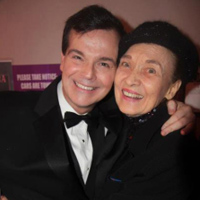
Photo: Russ Weatherford
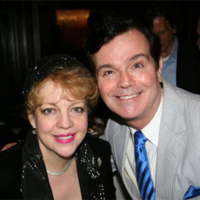
Photo: Russ Weatherford
After removing the tube, his diagnosis dramatically changed from Stage 4 to a Stage 3 (curable). He lived for the next two months with a tracheostomy. He had to relearn how to swallow, chew and utter sounds. With the help of speech therapists, he started creating pitches and then began singing in falsetto. His goal was to get the trachea closed so he could get on with life. Only two months after major surgery, he prepared his own pureed Thanksgiving dinner and by Christmas, the trachea was closed and he was able to eat solid food. Early in 2014, Richard returned to New York City and to the Paley Center and, by the following May, met with Tom Nelson and his director Dick Barclay to begin rehearsing a new version of the Astaire show. The subsequent performances at Don’t Tell Mama this past October were given “thumbs up!” by several critics and the performances were sold out.
Soon after, he received a call from Jeff Harnar and Andrea Marcovicci asking him to perform as part of the Burton Lane tribute at the upcoming Cabaret Convention. This was one of his dreams come true. Many colleagues who heard him that night agreed he was in great form and his recent battle was not apparent. Throughout his long and threatening ordeal, Richard maintained a mantra: “I still have things I have to do!” and he is doing them.
Kathleen Landis: How has this cancer experience affected you musically?
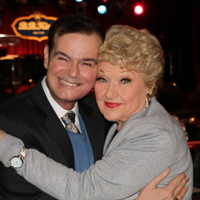
Photo: Kevin Alvey

Photo: Russ Weatherford
Richard Holbrook: I think it has taught me not to be afraid of taking chances. Many of my inner circle felt it was very risky for me to come back as quickly as I did, but doing the shows and singing at the Convention was what kept me motivated to get well and was actually responsible for my quick recovery. It was necessary for me, I guess, similar to a person getting back into the driver’s seat after a car accident. Also, along with taking chances, I feel I can dig deeper into the meaning of a song and now not be afraid to try it differently than I had sung it before in order to take it to a different level. Since my illness, there is a lot of emotion I need to express. I need to be able to show those feelings without self-consciousness. I want that emotion to be released and translated in my interpretation of the song.
KL: In your post-surgery days, what did you think and do to help your recovery?
RH: Well, I prayed a lot! I have strong faith in my religion and I have a very positive attitude. Luckily, I also had great support from family and friends. Anyone who sent me flowers, a card or even a Facebook message received a handwritten thank-you note with an update as to how I was progressing. I would take these letters and walk them to the post office. It gave me a reason to walk and stayed connected. I also kept a journal and that helped me “get it all out on paper”.
KL: OK, last question regarding your illness. Coming back from days of a non-verbal existence, how has this journey affected how you communicate as a person and a singer?
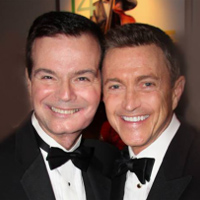
By Russ Weatherford
RH: One of the most enlightening lessons I learned is how important communication is. As singers, it is all about HOW we communicate through words, sound and
storytelling. For three days after the surgery, I couldn’t utter a sound. I wrote notes to my family, but they were illegible. I got so frustrated! I now have such empathy for people with strokes or other neurological conditions that keep them from be able to communicate with the world. Musically, this experience has taught me to really get inside a story through the lyrics—to really communicate! One song in particular comes to mind that expresses all this, it’s “Quiet Love” by Charles Aznavour. It is about the relationship between a man and the love of his life, a woman who is a deaf-mute.
When I was alone, I did have a nagging fear that I would not be able to sing again. My recovery at first was slow and the doctor told me I probably would not sing for at least a year or more. While I should have been grateful to be alive, I felt deeply saddened because singing has been my life and only in the last couple of years have I been able to more deeply trust myself, to go to a deeper level with what I did with my voice to communicate.
KL: Let’s go back to your beginning in New York. You have worked with the Tom Nelson Trio on every one of your shows since you started. This consistency has worked for you. Describe your relationship with your musical director and trio.
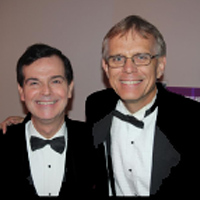
RH: I met Tom in 2000 and was immediately impressed with his musical talent and instincts. We have become more than colleagues, we are good friends. There must be a real trust between a singer and his pianist and, knowing each other for this long, we are very much synchronized to one another in performance. We know instinctively what we’re going to do next. This togetherness in the early rehearsals makes it easy to then add in Tom Kirchmer on bass and Peter Grant on drums. I feel really blessed to have had these musicians all these years. Right before we go on stage, I say, “Let’s have a party!” And we do.
KL: Since 2003, you have worked with director Dick Barclay. How has his direction changed your performance?
RH: Dick became my director when I did the Untapped Astaire show. He has a vast stage experience, which has helped me enormously. As you may know by now, I tend to be rather “wordy” and, when writing the script for my shows, I tend to go on…at length. Dick is wonderful at cutting out anything and everything superfluous. For example, what you say in setting up a song, Dick makes sure it is said simply and leads you to the song. He is also great in creating simple choreography, making it look relaxed and having fluidity. I am not a dancer, but for the Astaire medley, Dick had me work with a top hat and walking stick, so it took a lot of rehearsing movement by movement until it was…naturally a part of me…singing and movement connected. When I get too intense or rigid, trying to get something right, he will burst out laughing and then I laugh…it breaks up the tension in rehearsals and forces you not to take yourself so seriously.
KL: Why did you choose Burton Lane and what insights about the man did you gain?
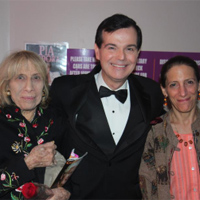
Photo: Russ Weatherford
RH: Burton’s work has not been as lauded as other American theater composers. Few people know that he was a protégé of George Gershwin or that he arranged the screen test for 13-year-old Judy Garland. Although he wrote only five Broadway musicals, he wrote so many great songs! I learned a lot about him as a man from his lovely wife, Lynn. For example, one of the reasons it took him so long to accept another show after writing Finian’s Rainbow was that he felt the books being offered were not strong enough. In addition to his prestigious positions as president of the American Guild of Authors and Composers, he served three terms on the board of directors of ASCAP. He was a generous and modest man. When composing “How Are Things in Glocca Morra?,” Burton wrote fifty drafts and didn’t like any of them. It was lyricist Yip Harburg who insisted he again play the very first draft for the song. That first idea became the breathtaking melody we know and love.
KL: I have often enjoyed coming to the Paley Center for Media to see films and programs that you and your good friend, Ken Starrett (U.S. Director of the Noël Coward Society) have jointly presented. Tell us about how you two became friends and your involvement with the Society.
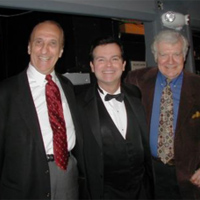
Photo: Roberta Zlokower
RH: I first met Ken at an art exhibit in 2003 and invited him to my Astaire show, which he came to see. His wife, Donna Sanders, a fine Broadway performer and singer, had recently passed away. We kept running into each other at cabaret events. He offered me the opportunity to share his apartment on the Upper West Side, which dramatically improved my life. Ken, in addition to being a great friend, is quite diversified in many areas of show business. He’s a fine actor, singer, dancer, acrobat and even stage manager. My musical world has been so enriched because he opened up the wonder of Noël Coward to me. Because of my position at the Paley Center for Media, I suggested that the Paley do screenings of Coward’s television and film work for Noël Coward Society members. They agreed and, in 2004, we presented Coward’s 1955 CBS special with Mary Martin. Today, we are presenting Coward’s films as well. It’s amazing how things have worked out.
KL: You have your annual Christmas in New York show coming up on November 30 and December 1 at Don’t Tell Mama. What do you love about doing a Christmas show every year?
RH: This will be my 12th show in Manhattan, but I started it in Rockland County, New York where I was born, performing in nursing homes and hospitals in the ’80s, then continued the tradition when I moved to Orlando during the nineties. But in 2002, I did my first Manhattan cabaret version of the show. It evolved to a more city-oriented holiday show with a jazzier feel. I’ve included some traditional songs arranged by Mel Tormé, along with newer songs like “It’s Always Christmas in New York,” by Ronny Whyte and Roger Schore, “Christmas Angel” by Sue Matsuki and Paul Stephan, “Christmas Eve” by Carleton Carpenter, a funny one by Francesca Blumenthal, “Christmas in New York,” and Sondheim’s “Children Will Listen.”
Doing this show is always inspiring to me because I can sing a variety of seasonal and inspiring songs by many different composers. My return audience is growing. Also, recently I have reconnected with old friends found on Facebook who come to the city and make the show part of a new holiday tradition. And Christmas has always been my favorite times of the year.
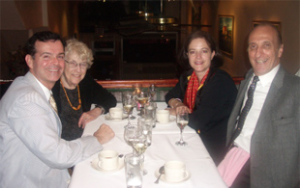
KL: In closing, is there any message you want to give to Cabaret Scenes readers about surviving a life-threatening illness?
RH: Going through something as life threatening as cancer really does change your perspective. You’re not as frightened about anything you want to try because you have already been out on that precipice and you survived it. Now, I was very lucky because the cancer had not spread any further, but, had I waited longer, I probably wouldn’t be here to tell it. Ever since, I do treasure even more what I love most in life—my family, friends and my health! It is so great to be back in New York and singing again, but most of all, it’s great to be ALIVE!
Editor’s Note:
Richard’s Christmas in New York is at Don’t Tell Mamma in NYC November 30 at 8:15 and and December 1 at 7:00 .
http://www.donttellmamanyc.com/home



